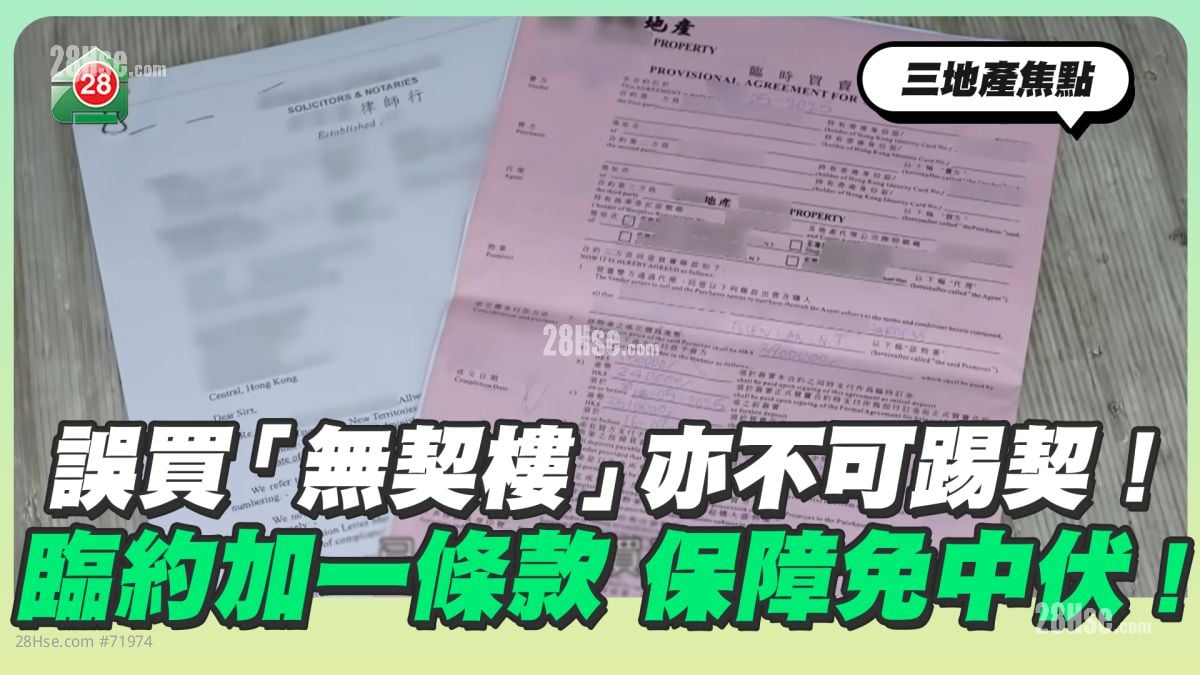A property deed is an essential document that serves as proof of ownership over a property, required for property transactions and mortgage applications. Recently, reports have surfaced of property owners losing their original deeds, causing properties to be classified as "deedless," resulting in challenging and costly complications.
When the original deed is lost, the property becomes a "deedless property." In such cases, the owner can apply for a certified copy of the deed, commonly referred to as a "copy deed." While this document appears similar to the original and holds legal validity, it cannot fully replace the original deed. Even with a certified copy, the property is still considered incomplete in terms of documentation, which may affect mortgage approval.
According to a report by the local TVB program Scoop (東張西望), one particular case involved a single mother who purchased a second-hand subsidised housing unit in Tai Po's Yee Nga Court. After paying a deposit of HK$260,000, she discovered that the property deed was only a "copy deed."
Upon being informed by her law firm about the issue, she immediately requested to cancel the transaction and retrieve her deposit. However, due to delays by the law firm in providing the formal copy of the sales agreement, she missed the seven-day deed disputing period. Furthermore, the agreement lacked specific clauses related to deed disputes. As a result, her deposit was forfeited, and she was also sued for compensation for cancelling the transaction.
The program consulted other lawyers for legal advice. They suggested that the buyer could file a court application to cancel the transaction, citing doubts about the validity of the "copy deed" and potential professional misconduct by both parties' lawyers during the transaction process. However, the final decision would ultimately depend on the court's ruling.
Generally, after both parties sign the formal sale and purchase agreement, the seller's lawyer provides the property deed to the buyer's lawyer for review. This review ensures there are no issues, such as the deed being a "copy deed" or the property having major defects—examples include unauthorised structures, structural alterations, or subdivided flats. If no issues are found, the buyer's lawyer will register the formal sales agreement with the Land Registry.
If issues are discovered, the buyer has seven working days after receiving the deed to raise reasonable ownership-related queries with the seller through their lawyer. If the seller's lawyer fails to provide satisfactory answers or evidence before the transaction is completed, the seller is considered to have breached the agreement. The buyer then has the right to dispute the deed. If this is successful, they can terminate the transaction, retrieve their deposit, and apply for a refund of the stamp duty from the Inland Revenue Department. To protect themselves, buyers should include specific clauses in the provisional agreement for sale and purchase.
Recently, some buyers experienced issues because the clauses they included were too vague, making it difficult to dispute the deed. Fortunately, in one case, the owner eventually recovered the original deed, allowing the transaction to proceed. The buyer had added a clause in the provisional agreement stating: "If the owner's deed and ownership are incomplete, the owner agrees to refund the full deposit, cancel the transaction, and release both parties from liability."
However, under the law, if the owner provides a certified "copy deed" along with a sworn declaration, it is considered a valid deed. Therefore, even though the property in question had a "copy deed," the buyer could not dispute the deed. To ensure maximum protection, buyers should include a clause stating: "The owner must provide the original deed; otherwise, the buyer has the unilateral right to cancel the transaction, and the seller must refund the deposit."
Like

